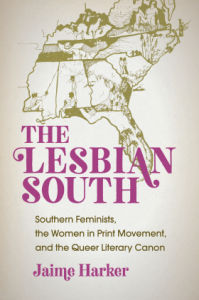Jaime Harker, director of the Sarah Isom Center for Women and Gender Studies, will sign and present her latest book, “The Lesbian South: Southern Feminists, the Women in Print Movement, and the Queer Literary Canon,” Monday night at 5 p.m. at Off Square Books. In the book, Harker explores an often unspoken and forgotten narrative in Southern letters.
“The Lesbian South” shows how Southern women contributed to the Women in Print movement through a “queer union of women’s liberation, civil rights activism, gay liberation and print culture,” according to the publisher’s description. Harker’s writing shows how these women helped the movement grow and remain influential from the 1970s through the 1990s, all while birthing writers, readers, bookstore owners and publishers.
As an English and gender studies professor, Harker has written many books and essays on subjects ranging from William Faulkner to Oprah’s Book Club. She said that, for the most part, the process of writing “The Lesbian South” was not much different than her previous efforts.

Photo Courtesy: University of North Carolina Press
“I spent a lot of time tracking down publications and learning about the web of relationships between the writers I study,” Harker said. “What is different about this book is that I look at a wide number of authors in a distinctively lesbian feminist reading and writing community, focusing on writers with an investment in and identification with the South.”
In “The Lesbian South,” Harker analyzes the works of well-known authors such as Dorothy Allison and Alice Walker as well as many other writers, editors and publishers. Harker said the in-depth research required for this book was the most challenging part of the project.
“Each chapter weaves in experiences and writing by a number of Southern authors,” Harker said. “I worked very hard to make the relationships clear, even as I was juggling multiple narratives.”
With this book, Harker said she would like for her readers to have a different understanding of the South and the queer Southerners that made their place here.
“I’d like (readers) to see that queer Southerners have been claiming their space here for a long time,” Harker said. “The particular group of Southern writers I study were invested in reimagining the South as a place of radical politics, transgressive sexuality and inclusive space.”
Though much of “The Lesbian South” is literary criticism, Harker said that she has included some of her own story in the book. This, she said, is a testament to the fact that the works by authors in the book are part of a continuing conversation in the South.
“I weave in some autobiographical narratives of my own experiences in the South because I wanted to make it clear that the lesbian South I am researching is an ongoing tradition,” Harker said. “LGBTQ feminist Southerners continue to work to make the South a place that nurtures all of its citizens, and I would like my readers to leave with a more expansive sense of Southern tradition and identity.”






